By Jeffrey A. Rendall; Images Courtesy of CBS Sports and Larry Lambrecht
You hear it a lot – sarcastic quips by non-golfers at the water cooler spouting off about how golf on television is boring. Ratings, sponsorship and golf’s loyal followers tend to disagree, but it’s pointless to argue with the ignorant. They just don’t get it.
Truth is, golf is a real form of entertainment. It’s different every week, and it’s played by real people with real stories – and the ‘new’ TV coverage reflects that.
Maybe it hasn’t always been that way. If you watch highlights from years long past, the presentations were a bit more mundane. And although classic announcers such as Jim McKay and Dick Enberg will never be ‘boring’ to those of us nostalgic about history – some might dial up those late night re-runs on the Golf Channel for a potential cure for insomnia.
But even to the casual observer, golf’s got a different aura these days. And while NASCAR’s become more popular to TV viewers than the NBA, the game played on the largest of all sporting stages by players with funny looking sticks and a little white ball has never been more in style.
Golf is cool now. Who would’ve ever guessed?
Much credit goes to Tiger Woods and the new generation of stars, such as Aaron Baddeley, Grace Park and Sergio Garcia. The popular media treats them like Hollywood celebrities, and rightly so – they play to millions every week.
But you could also say it’s because the game’s presented in a different way than it used to be. Golf’s always carried a stigma of being played by rich white men at exclusive private clubs – and TV’s coverage tended to reflect that stereotype. Thankfully, that boring and stuffy image has changed, with golf commentators speaking with a certain edge that previously would never have been welcomed – or allowed.
There’s Johnny Miller’s reputation for a sharp tongue and blunt honesty. Ditto Curtis Strange, who’s been known to utter a comment or two that draws some attention. Then there’s the humorous lot, led by CBS Golf Analyst David Feherty.
Irishman Feherty follows a path first blazed by fellow CBS Analyst Gary McCord, even crediting McCord for helping ‘recruit’ him into broadcasting. Prior to coming to CBS, Feherty was a virtual unknown to the American public. We caught only brief glimpses of him while competing for the European team during the ’91 Ryder Cup and there was also a top five finish in the 1994 British Open to perhaps catch a look.
We’ve gotten to know him since, though. After retiring from competitive golf in 1997, Feherty’s established a commentating style all of his own – and his unique brand of humor has also landed him on bookshelves and magazine stands, as well. With book titles like ‘Somewhere in Ireland, a Village is Missing and Idiot,’ his self-deprecating humor and candid observations have established a niche amongst avid golf fans.
In a GolfTheMidAtlantic.com exclusive interview, he shared his thoughts on the ‘hot’ topics of today, including the upcoming Ryder Cup, women playing on the men’s Tour, and modern day crowd behavior. Direct and personable, he’ll let you know where he’s at – and you’ll probably laugh in the process:
GTMA: You’ve established a bit of a different model in golf commentating – a successful player who traded his clubs for a microphone. When did you decide to go into TV?
Feherty: Well, it wasn’t really after my playing career -- it was instead of. It was right around the time that CBS was looking to replace Ben Wright – I guess golf on TV needed another foreign voice.
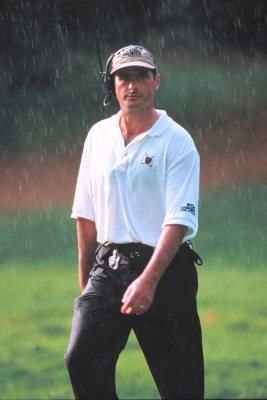 |
| Even in the rain, Feherty seems right at home with the headset on. Photo By Larry Lambrecht. |
It’s actually something I always wanted to do. Even when I turned pro at 17, I said I probably wouldn’t play past the age of 40. I wanted to get involved in some kind of journalism, as long as it didn’t involve any actual work -- because I do try to avoid that as much as possible, and doing TV isn’t really like working.
I guess I was the right illegal immigrant at the right bar at the right time, and then it happened.
GTMA: Do you think what happened to Ben Wright was justified?
(Ed note: Englishman Ben Wright got into trouble in 1996 with some all too forthright comments about women golfers, breasts and lesbians – and was asked to resign.)
Feherty: No, I never did. I miss him. He was one of the great voices of the game and it was just a deal where – people need to apologize and get on with it. People are way too thin-skinned.
GTMA: Speaking of thin-skinned, or not so thin-skinned, you’ve said that Gary McCord was instrumental in ‘recruiting’ you into golf commentating.
Feherty: Yes, yes he was. It was pretty much his fault, actually. If it hadn’t been for him, I don’t think there would have been a place for me. It’s not so much that he broke the mold, he pretty much forgot where he left it. He can’t find it, and he really changed the way people think about commentary in golf.
GTMA: Do you find yourself having to do a lot of preparation for your broadcasts?
Feherty: No. No, because I’m on the grounds, I’m outside. You can’t really prepare for that. I mean, you react to the situation, but you don’t prepare for it. You go out there and call it as you see it.
GTMA: Do you see any of the current group of players who will make up the next generation of on-course analysts?
Feherty: You know, I do. I see people that I would love to see with a microphone. Someone like Tim ‘Lumpy’ Herron -- you know, he’s just fantastic.
He’s priceless, a big fat guy with bad habits. Just like John Daly. The perfect torch carrier.
GTMA: How about John Daly?
Feherty: I don’t really see John Daly as an analyst so much. He’s more of a guy with the remote control at the other end of the TV than someone who’s out on the course.
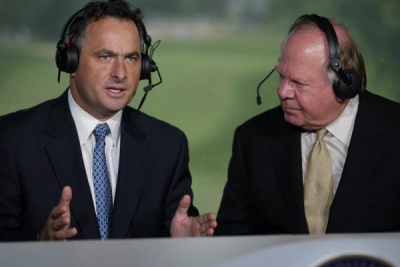 |
| David Feherty and Verne Lundquist -- CBS Sports 2002 PGA Championship. Photo: Mike Ekern/CBS. |
GTMA: Have you ever gotten in trouble for something you’ve said on the course?
Feherty: No, not really. The players don’t mind – they’re smart enough, with a sense of humor, to know that it’s a game – and that I’m not going to say something mean spirited or nasty about their swings.
Hopefully, what I say will be humorous and give the players an opportunity to seem more like human beings and give them more of a human face by their reactions, too.
I mean, you can call it criticism if you want, or analysis or observation… it’s an absurd game, and it deserves some absurd commentary at times.
GTMA: Some of your fellow commentators are seen as controversial. Do they deserve the reputation?
Feherty: Yeah, it’s controversial, and there’s, whatever you see… people just see things the way that they see them and I see them from a different angle, that’s all.
I think Johnny’s (Miller) a great announcer – I don’t agree with everything he says or the way he says it, but I think he’s got a legitimate voice and a point of view – and so does Curtis (Strange), who’s been very underused at ABC, and really hasn’t been given a whole lot of support. I really like him as a lead announcer.
GTMA: Why would you say he’s underused?
Feherty: I think, he should have more of a voice, to be honest, to be able to ask more relevant and searching questions.
GTMA: Are you pretty much given freedom to ask what you want at CBS?
Feherty: Well, we have a different style. We say less, we have less space to work in than the other networks. We show so much more golf – we try to show shot-shot-shot-shot at CBS. If you can’t figure out how to get out what you’re saying within seconds, well then, you’d better be looking for other employment.
Don’t get into a paragraph, whatever you do.
GTMA: Do you say what you really think, or sometimes hold back?
Feherty: No, it’s the third or fourth option – that’s why there’s a silence before I speak sometimes, like running stuff through.
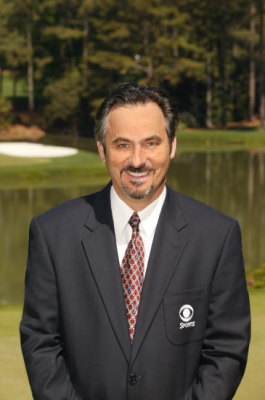 |
| David Feherty at the 2004 Masters. Photo: Craig Blankenhorn/CBS. |
GTMA: Have you ever had any run-ins with the fans?
Feherty: Not run-ins, so much. I think I’m pretty approachable, so I do get a lot of people talking to me. My demographic is, you know, overweight white people holding plastic cups. So I get yelled at a lot. ‘Feherty, you moron!’ -- that sort of thing, which I seldom disagree with.
So, no run-ins, really.
But you’ve always got people coming up to you, whispering into your ear that’s got a headphone on it. People don’t seem to understand that you’re doing a live telecast, and you may not have… you know, I’m trying to listen to the producer and the damn program. And to think of relevant answers to whatever stupid questions they might ask before they actually do it.
So if somebody comes up and whispers in your ear, they don’t seem to get the fact that a), I’m wearing headphones, and b), you’re pissing me off.
GTMA: Crowd behavior seems to be an issue these days. Take what happened with David Love III out at the Match Play, when he refused to play on until that heckler was removed. Are the crowds out of control?
Feherty: I was a little disappointed there. Not with Davis -- I was disappointed with the rest of the crowd. If you get some moron in golf who just wants to mouth-off, somebody should just smack ‘im – you know, shut-up, pal.
Golf’s not baseball, it’s not football, where players play against a constant background of noise. If you get one irritating prick out on the course, he can make his voice heard and it just doesn’t happen in golf.
Can you imagine if someone was heckling behind home plate at Shea Stadium and his was the only voice you could hear? He’d have the s--t beat out of him inside of 10 seconds.
A lot of that – crowd control -- should be done by the people who watch golf. There’s no place for a moron like that. And the crowd should take care of it – it shouldn’t be up to the players to take care of that.
GTMA: Do you think it’s gotten out of control?
Feherty: No. It very seldom happens.
GTMA: From a players’ standpoint, and from an ex-player's standpoint, can you compare your experiences in the ‘old days’ when you first started in golf to the way it is now. Do you think films like ‘Happy Gilmore’ have really influenced the way people see golf?
Feherty: I think it’s kind of popularized golf – stuff like that and the influence of Tiger Woods – they make golf a good deal more ‘cool’ than it used to be. It used to be a rich old white man’s game -- you know, stuffy, country club atmosphere and all that.
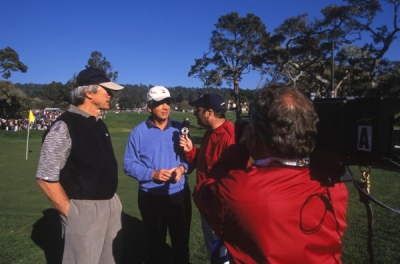 |
| AT & T Pebble Beach; Clint Eastwood, Peter Uberroth and David Feherty. Photo: Craig Blankenhorn/CBS. |
Now you see more of the shirt hangin’ out, the fact it’s really a game for the masses, hopefully. And it’s still a game where you can drop your kid off at the golf course and be gone for six hours and you know what he’s doin’. There’re not a lot of sports you can say that about.
GTMA: How would you compare the crowds in the United States and those you see in Europe?
Feherty: Well, it’s different. For starters, we play in so many different countries in Europe, and the crowds in Holland are different than the crowds in Ireland… but then again, the crowds are different in Boston as compared to LA, too.
There’s a different culture all over this country, and it’s reflected in the ‘Quiet Please’ signs. There’s ‘Hush y’all’ in Memphis, and ‘Chill folks’ in LA and it should say ‘Shut the f--- up’ in Boston and New York.
GTMA: Speaking of New York, what do you think of Shinnecock Hills (the 2004 US Open venue), and would you compare it to any of the Links-style courses overseas?
Feherty: I’ve never played it, but I’ve seen it, and it’s clearly a great golf course.
As far as comparing it to Europe, it doesn’t really compare, because the turf is so different. Links golf courses here in the northeast, they really don’t play as hard and fast as they do over there. It’s still more of a target golf sort of atmosphere with the links courses here.
But it does have that kind of atmosphere, with the long grasses and the exposure, and all of that.
GTMA: Got any predictions on who will win?
Feherety: I don’t know. It’s the easiest of the four majors to win, because of the way the golf courses are set up -- they tend to choke everyone down to the same level. It’s really hard to say.
If you look at the list of winners of the US Open over say, the last 30 years, there’s a bunch of people who’ve won once or twice, whatever, that really haven’t won very much else.
That’s a real toss-up. In other words, I don’t know.
GTMA: Corey Pavin won it the last time at Shinnecock. Do you see the set-ups these days going away from lighter hitters, such as Pavin?
Feherty: It’s harder for the smaller guys in general to compete these days.
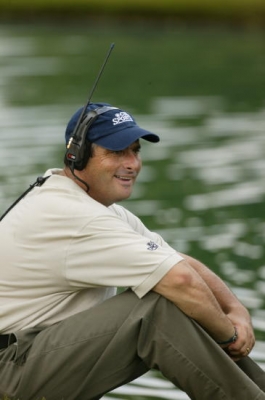 |
| Sittin' down on the job at the 2003 Colonial Golf Tournament. Photo: Craig Blankenhorn/CBS. |
When you think about it, 20-30 years ago the really tall guys had tremendous difficulty finding equipment that fit them. If it was long enough, it was always too heavy and swung like a tire-iron -- those big heavy wooden, small headed clubs with long steel shafts.
Now the big guys can get equipment that really fits their swings correctly.
So the next big superstar in the game is likely to be a giant, because we now have equipment that’ll fit him.
GTMA: Do you see anyone in the current crop of young players who’ll be the next superstar?
Feherty: I think it’ll be extremely difficult for anyone to be a real superstar – until Tiger’s dead, probably. I don’t see anybody doing what he’s done, perhaps even for the next century, who knows.
I think we’ll see the ‘Tiger effect,’ probably in the next 10 years. There’ll be a group of kids who were 4 and 5 and 6 years old, watching him do what he did a couple years ago – that will feel the same way about him that he did about Jack Nicklaus when he was growing up.
So, the current crop of great players – and they are great – the Els’s and Mickelson’s and you know, the Goosen’s, Singh’s. They’re too old now, and they were even at that time. They looked at what Tiger could do and realistically they were saying ‘There’s no way I could hit that shot,’ and ‘I’m never going to be able to do that.’ But the young kids – the ones who are 4, 5, 6, 7, 8 years old, who are interested in golf because of Tiger Woods… there’s no pre-set limit on their imaginations.
They’re the ones that are set a little freer.
GTMA: In your opinion, what makes Tiger different than the others?
Feherty: He’s just wired differently. To win by 12, or by 8, or by 15 in major championships on golf courses like that, you get so far out in front and it’s hard to make a birdie, to protect the lead. But he does it because he’s just wired differently.
Physically, he’s just more ‘able’ for it. And mentally tougher. Just extraordinary. It wouldn’t matter if he’s playing golf or a musician or anything else – he’d be making millions doing it, he’s just that kind of person.
GTMA: Would you say he’s the greatest pure athlete who’s ever played golf?
Feherty: No question. He’s taken over golf, the way that Sam Snead made the game look like an athletic pastime back in the forties.
Then Palmer in the fifties, he made the game sexy -- because before Arnold, golf wasn’t sexy, with all those old farts in tweed pants.
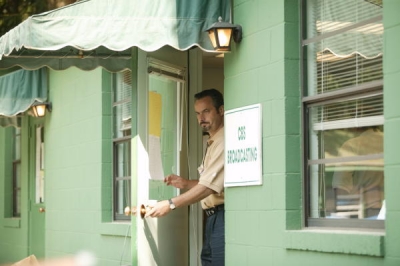 |
| Leaving the press room at the '04 Masters. Photo: Craig Blankenhorn/CBS. |
Someone comes along about every decade to alter the way the game is perceived by the general public. Tiger, he’s done that in the same way that either of those other two guys did. Whether he can last like Palmer is another story.
GTMA: Speaking of changing perceptions, your Cobra ads are hilarious. I’ll never hear ‘nice ball’ again without thinking that’s a put-down.
Feherty: Nice ball. Sounds like some idiot shouting at me from behind the ropes, and they can’t get it right, saying ‘Nice shot,’ and I say no, you friggin’ moron. It’s not nice shot…
Then they’ll say, ‘I love your Taylor Made ad.’ Ooohh yeah, that’s really working.
GTMA: What are your thoughts on equipment technology? Do you think these guys are just blasting the ball so far that it’s changing the game?
Feherty: No, not at all. The game’s still impossible. It’s still a really, really tough game. And these guys are so much more athletic than in years past.
You know, golfers wear clothes so you can’t see what sort of shape they’re in. It’s not like the NBA, where you can see the athletes – if you look 30 years ago, it was a bunch of big white stiffs in bad shorts. Now, I think they’re incredible athletes.
The game of golf has changed in the same way. It’s as much to do with physical conditioning as it is with the right equipment.
There is one thing the USGA has completely whiffed on – you wouldn’t need to have regulations on drivers or golf clubs if you just altered the size of the ball. A slightly bigger ball would cure all of these problems. It would make your old golf courses more relevant; it’s harder to hit into the breeze, it spins more, it’s harder to hit straight, it won’t go in the hole.
It’s just the ball needs to be bigger, you morons.
GTMA: Along those lines, do you think there should be a tournament spec. ball?
Feherty: No. I mean, the competition between the manufacturers is great – it drives research and development and makes the game more fun.
That’s the other thing – the easier to pick the game up, to get the ball in the air, to get that first feeling when you first start, ‘wow, that was really cool,’ that’s a good thing.
And if you think technology is bad, and it’s destroying the game, then just throw away your driver and get out your old wooden driver. Go to the range and top it a few times, and you’ll wonder how you ever played with it.
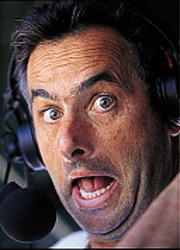 |
| David Feherty writes for Golf Magazine in addition to his CBS duties. Photo from GolfOnline.com. |
Golf’s more fun now than it’s ever been. Why mess with that?
GTMA: Switching gears a bit, what are your thoughts on the controversy surrounding Michelle Wie and women playing on the men’s pro Tour?
Feherty: I think it’s very interesting to see a woman come around every now and then and attempt to compete against the men. I think it’s great sport, it’s a good spectacle.
But just because they’re women doesn’t mean they can’t do math. If Michelle Wie wants to compete and plays well against the men in any given week she might make the cut – I mean she is that good, she’s extraordinary.
She might make 10 or 20 thousand dollars in that tournament. But if she played that well in the same week against a field in the LPGA, she’d win $200,000. She may be 14 or 15 and female, but she can still do friggin’ math.
So it’s going to be economics driven. It will be interesting from time to time to see that happen, and I love it, but you’re not going to see it on a regular basis.
GTMA: Do you think there’s ever going to be a woman who could compete regularly with the men – and if you do think so, would Michelle Wie be that woman?
Feherty: No. No, I mean the closest there’s ever been has been Gary McCord – who is a woman, and even he couldn’t win.
GTMA: Finally, the Ryder Cup. Any Ryder Cup memories you’d care to share?
Feherty: I only played in one at Kiawah Island, and every time I think about it I get the shakes and have to lie down for a while.
It’s the greatest event in golf, and I wish we had it on CBS.
GTMA: You played your singles match against Payne Stewart in ’91?
Feherty: That’s right, I did, yeah. It was special. He was a special person.
GTMA: He helped you along there.
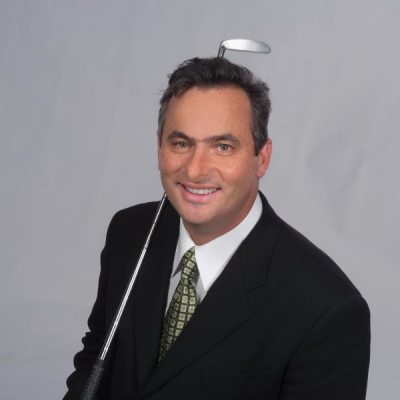 |
| Feherty gets dressed up sometimes, too. Photo: John Filo/CBS. |
Feherty: Yeah, he was a great friend of mine. That’s the one thing that people tend not to… I think the media in general, there’s a ‘He said, she said’ story before every Ryder Cup.
I’m actually finishing a book on the history of the Ryder Cup, and the controversy’s not anything new – it’s been going on since 1926. Henry Cotton, I think, complained about the Americans’ grooves, and the following year Hogan complained about the British grooves… and Bernard Darwin wrote this… and somebody was right, and somebody was wrong… and the wives created a stir in ’51 when they refused charity from Robert Hudson in Portland, Oregon when he sent sides of beef, and all that crap… because there was food rationing.
It’s just always been ‘chippy,’ you know?
It’s because there’s no money involved. That and the Stanley Cup are the last two true sporting events left on earth.
GTMA: There’s been some talk and some suggestions about making the Ryder Cup format kind of more like the Presidents Cup format, in terms of holding more matches…
Feherty: God. Anything that makes it more like the Presidents Cup would be a bad idea.
GTMA: Why is that?
Feherty: Because the Presidents Cup is irrelevant, that’s why.
GTMA: Is that because it’s new?
Feherty: No, it’s because it’s a bunch of American guys playing against a bunch of guys who live in Orlando. There just isn’t the… I guess maybe you could say it’s because it is new, and maybe if it has a chance to continue, and develop some sort of rivalry.
The Presidents Cup lacks that rivalry. There’s no animosity, either. You need Seve (Ballesteros) and (Paul) Azinger. You even need Ken Still, the prick. You need those characters that genuinely want to win the cup, and they want to piss off the other guys while they’re at it.
GTMA: I sided with Azinger. Seve’s a jerk.
Feherty: Well, you know, yeah, it doesn’t make you a bad person.
He was worth keeping your eye on.
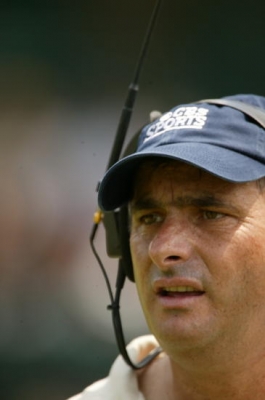 |
| At the 2003 Colonial Golf Tournament. Photo: Craig Blankenhorn/CBS. |
GTMA: Do you think the players’ behavior in the recent Ryder Cups – has that gone overboard?
Feherty: No. I don’t think so. Somebody jumping up and down, and punching the air… whatever turns you on. We’ll be watching the Ryder Cup for a long, long time to come, because that’s how the players feel about it. It’s bragging rights – it’s kids on a playground, that’s what it is.
GTMA: Do you think the Europeans were so upset that they lost in ’99, or do you think the American team really behaved badly?
Feherty: No, no. I don’t think it was that. It was that particular outbreak that makes it kind of an outbreak, which makes it sound like herpes.
It was the due to the way the American team had been treated by their own media. They’d been portrayed as greedy, that they didn’t care about the Ryder Cup, that they didn’t like each other, and all they wanted was money. You know, which was all bullshit.
All they wanted was 5% of the profit that was generated to donate to their own charities. And yet they were absolutely vilified in their own media. They were told that Justin Leonard shouldn’t have been there, and Sergio Garcia – that Jim Furyk had no chance against Sergio Garcia, who was like 11 at the time.
And when that putt went in, it was a giant ‘Hey, up yours!’ to everyone who said they weren’t a team, and they didn’t like each other, and they didn’t care about the Ryder Cup.
It was one of the great afternoons in all of sport, that Sunday. I was there on the edge of the 17th and saw the whole thing. I didn’t like the outcome, and I wanted the Europeans to win it, but I recognize a great sporting event and atmosphere when I see one and it was just friggin’ unbelievable.
They looked like a team. They looked like they cared about the Ryder Cup and not one of them could give a s--t about money that night. And I didn’t read any apologies either.
GTMA: There’d been some talk in the late 90’s about some of the team members who made the team possibly not playing. Was that ever serious?
Feherty: No. Nobody does that. (Tom) Weiskopf was the last one, because he wanted to go hunting. I’ve yet to find out why that happened, but if you make the Ryder Cup team, you will play. It means more than anything to these players.
I think it meant more than anything to Nicklaus and Palmer, even when they were winning all the time – it’s special, it’s their only chance to play for their country, and I think it’s just a special thing to do.
GTMA: How about this year’s Ryder Cup?
Feherty: I’m really looking forward to Detroit – I’m pretty sure there’s going to be a riot started by a Red Wings’ fan.
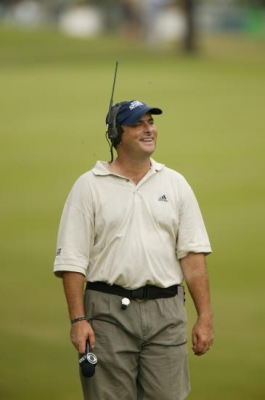 |
| Feherty usually leaves you with something to smile about. Photo: Craig Blankenhorn/CBS. |
Somehow, if there’s a riot going on, you’ve just got to think David Feherty will be right in the middle of it. He’s got a knack for being there, telling us about it, and making it funny along the way.
Details:
Thanks to David Feherty and Robin Brendle of CBS Sports for their generous gifts of time and energy – much appreciated.
| Related Links | Comments on this article? | |
|
Maryland National Golf Club Hollow Creek Golf Club Rocky Gap Resort PB Dye Golf Club in Ijamsville Whiskey Creek Golf Club |
E-mail Jeff Rendall, Editor: jrendall@golftheunitedstates.com |












